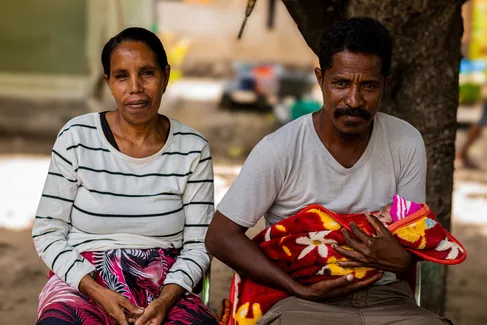Using social accountability to improve healthcare
Feedback drives action, so services can better meet people’s needs.
Timor-Leste
Purpose
Enhancing social accountability to improve health service delivery
Approach
A co-designed hotline system with digital tracking and analytics for efficient feedback, issue resolution, and response.
Partners
The Timor-Leste Ministry of Health, supported by Australian Aid
Empowering Change Through Complaints: Enhancing Healthcare in Timor-Leste
When people recognise that something isn't right, they can take steps to fix it. That's why making it easy to voice complaints is so important. It drives action and change, ensuring services better meet people’s needs and remain accountable to those who use them. Through innovative technology, we are streamlining the process for the Ministry of Health’s Quality Control Department to record problems and develop effective solutions.
The Centru Atendimento das Reclamações (CAR—the Quality Control Centre) is an initiative designed to assist the Ministry in enhancing healthcare, hospital, and clinic facilities across Timor-Leste. CAR helps resolve complaints submitted by patients and health providers via phone. This system alerts decision-makers when issues like long wait times, limited medicine, or a lack of essential supplies need urgent attention. Through a digital system, problems are logged, tracked, and resolved, ensuring better care for everyone at medical facilities.
The Importance of Social Accountability
Social accountability is essential for improving health service delivery in Timor-Leste. It ensures that healthcare providers are held responsible for the quality of care they deliver. When patients and health providers can voice their concerns and complaints, it creates a feedback loop that highlights areas needing improvement. This transparency drives better resource allocation, enhances service delivery, and ultimately leads to improved health outcomes.
By empowering citizens to raise their voices, we foster a culture of accountability and responsiveness. It helps build trust between the community and healthcare providers, ensuring that the services offered are aligned with the actual needs of the people. In Timor-Leste, where healthcare infrastructure is still developing, social accountability is fundamental to creating a robust health system that can adapt and grow.
Our team employed a co-design approach using Human-Centered Design (HCD) principles, focusing on simple understanding and empathizing with the issues faced by the public and the government. Working in a complex, resource-constrained environment, we aimed to create solutions that are practical and effective.
Mapping Issues and Resolutions
Understanding that complaints are only valuable if they are acted upon and resolved, we collaborated with the Ministry of Health to map out resolution pathways. We identified accountable departments for each type of complaint and categorized them accordingly. This process involved converting complaints into actionable items and assigning responsible parties to ensure follow-through.
Accessible Reporting Mechanisms
We utilized a free hotline and implemented a promotional campaign featuring radio spots and posters to raise awareness. Additionally, we incorporated simple mechanisms such as SMS to make it easy for people to register their issues. This multi-channel approach ensured that everyone, regardless of their technological proficiency, could participate in improving the healthcare system.
Digital Issue Tracking System and Analytics
A key component of our approach was the implementation of a digital issue tracking system. This system allows for real-time logging and tracking of complaints, ensuring that no issue goes unresolved. Additionally, we integrated analytics capabilities to better understand emerging themes and response times. By analyzing this data, we can identify recurring issues, monitor the effectiveness of responses, and continuously improve the healthcare delivery process.
Overall, the CAR system has helped support the Ministry of Health to be more responsive to the needs of its citizens. By providing a platform for complaints and feedback, we have helped create a mechanism for accountability. This project showcases the transformative power of technology in driving social accountability and improving public services.


![Wheelchair LR [rgb].jpg](/media/images/Wheelchair_LR_rgb.format-webp.height-325.webp)